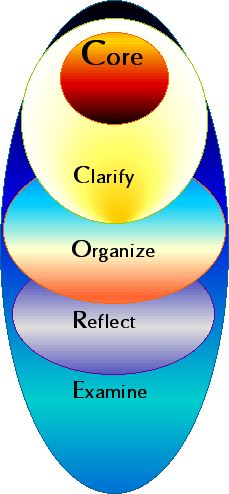 Stories
about Technology
Stories
about Technology Stories
about Technology
Stories
about Technology
Judgment | Virtuosity | Titanic forces | A Faustian Bargain | Labor | Noise & Its absence | Desire ![]()
Thamus, King of Egypt whose warning to Thoth went unheeded.
Daedalus, the artful builder of the Labyrinth who lost his son Icarus.
Prometheus, Titan who was punished by the Olympian gods for giving fire & tools to humanity.
Faust, made a bargain with the devil for his soul and required redemption.
Frankenstein, the new Prometheus, Mary Shelley's modern commentary that warns technicians go too far in using new tools such as electricity to mimic life in a sort of denuded and denatured manner, thus the monster, beautiful at the start decays into a horrible creature.
John Henry, "a steel drivin' man," hero of the song who dies working hard to lay even more and more track for the railroad, even to the point of self-destruction.
Jack Gladney, White Noise, DeLillo's protagonist in the College-on-the-Hill survives with his family "an airborne toxic event," only to have to protect his wife from mood altering drugs, violent thugs and German nuns in a farcical look at how tools delude us into thinking we know something accurately when all we really have is an incomplete picture of reality.
E. M. Forster, "When the Machine Stops" a post modern allegory. He wrote this to counter H. G. Wells utopian novels that express a technophile's naive approach to admiring tools because he embraces automated technologies.
Margaret Atwood argues that technology constitutes an extension of ourselves to compensate for the fears and desires of what we wish we were but, alas, are not. In her story of the Odyssey from Penelope's (Ulysses' wife) perspective, she opens our imaginations to a wider cast and a broader set of possibilities, suggesting that a story has innumerable sides.
Stories have numerous sides for precisely the reason that if they are told from one narrators point of view, they can --of course-- be told from every member of the casts perspective.
![]()
Judgment | Virtuosity | Titanic forces | A Faustian Bargain | Labor | Noise & Its absence | Desire
![]()
 Any story is an expression of understanding of even those things that baffle us and escape our comprehension. From Harry Potter to the Book of Jonah, stories convey our hopes, fears, worries and desires concerning a world about which we are largely clueless.
Any story is an expression of understanding of even those things that baffle us and escape our comprehension. From Harry Potter to the Book of Jonah, stories convey our hopes, fears, worries and desires concerning a world about which we are largely clueless.
"Our ignorance of the universe is so vast," says Martin Amis "What do we need all that for?" as a novelist he asks about the immense expanse of the universe and its many very strange artifacts such as galaxies, quasars and black holes. The world is just too wondrous and events too enigmatic for us. So to describe them we tell ourselves and those who will listen, our stories.
Thus, humans and story tellers because we need to make sense of our experiences. This may also be because we imagine things, understand symbols and remember things by repeating them over and over again as a sort of memorial to the events that pass so quickly.
![]() "The telling of stories is not a simple act,
as writer Susan Griffin explains it, but a way of narrating events that gives
the listener ‘a path through those events that leads to some fragment
of wisdom’ by such transmission, consciousness is woven.”
"The telling of stories is not a simple act,
as writer Susan Griffin explains it, but a way of narrating events that gives
the listener ‘a path through those events that leads to some fragment
of wisdom’ by such transmission, consciousness is woven.”
(Gary C. Bryner, Gaia’s Wager, (2001), p. 177.)
So what do stories about technology, or tools reveal to us about past societies and the tools that engaged their imaginations? The stories are varied so as to reveal several threads from a hopeless infatuation with new tools to a dread of losing our souls to the machinery and the mechanics we so readily rely on. Writer Joan Didion questions if we are not "lost in the machinery of everyday life?"
If we search the above stories, and look for others we see their are both simple and complex approaches to tools expressed by writers, such as Cervantes. In his novel Cervantes created the image of Don Quixote, "tilting with windmills" because he thought they were giants as a lasting reminder that we have often misapprehended what tools mean.
| Simple | Complicated |
||
|---|---|---|---|
good |
Prometheus | skeptical | Thamus |
bad |
Frankenstein | immoral | Faust |
utopian |
Time Machine | distopian | White Noise |
It is easy to explain technology as a positive factor in our lives, but novelists as critics have, according to Aristotle, a duty to educate us and uplift us. Writers do this in a wide range of stories with varied images from the fabulous as the H. G. Wells stories are about space and time travel. But there is a much darker humor savaged on modern society's fascination with drugs, violence, and automated machinery in Don Delillo's White Noise. The history of these fables about how tools and technology influence our lives have provided writers such as Mark Twain and F. Scott Fitzgerald with a wide array of images that convey the complexity of our relationship with inventions, gunpowder, electricity, cars, homes,and the status we associate with these possessions.
![]()
Judgment | Virtuosity | Titanic forces | A Faustian Bargain | Labor | Noise & Its absence | Desire
![]()